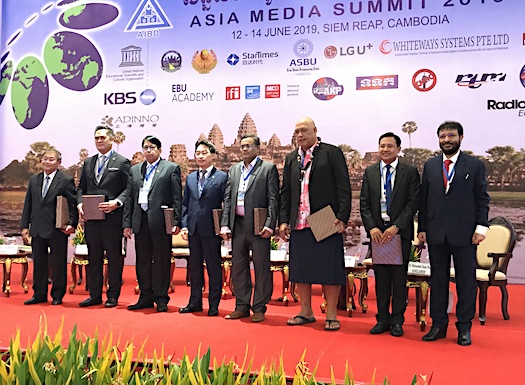At the Asia Media Summit, a range of ministers and department heads spoke about the progress of their countries in adapting to the evolution of media and the introduction of smartphones and social media.
The most forthright was the Myanmar Information Minister Pe Myint.
He said the country has progressed a long way from its previous practices of restrictive media regulations, but says his government wants to understand and adapt to digital media to bring further benefits to its citizens.
“I want to know more from experts who are familiar with this new phenomenon. I want to get the best results from this revolution while mitigating against the negative effects of this revolution.
“We noticed the signs of this revolution only 5 or 6 years ago… the instantaneous spread of information on social media. Facebook dominates the field in Myanmar.
“The use of mobile phones and social media empowers people, but it can also become a breeding ground for media and disinformation…
“Freedom of expression was seriously restricted in Myanmar for decades, but now people can disclose what is in their hearts and minds.
“Social media is a very effective tool to disseminate their thoughts and feelings to their friends and to us politicians. This is a positive thing that people have gained from the digital revolution.
“Another thing I have noticed is that those who use social media are not people who usually read newspapers or write their opinions… they are now getting practice in literacy and engaging with the broader society through digital media.
“The digital revolution is also helping our people grow online businesses and commerce, especially by young people. These are visible signs of people embracing the digital revolution.
“My government has to catch up with these developments… we are introducing an eGovernment system and are introducing new policies to stimulate the digital economy. Sweeping changes will be made to upgrade the digital infrastructure.
“Myanmar is eager to embrace the digital revolution and become a digital nation with digital citizens, but we need capital investment, cooperation and coordination to achieve our goal.”
Cambodia’s Minister of Information Khieu Kanharith talked about fake news as being one of the major issues in his country:
“Fake news is everywhere. It is an issue of how to deal with information.
“In Cambodia people know that radio tv and press have responsibility before the law, so they are more responsible. But the new players mean that we need to use new strategies to inform the public. This is one of our challenges.”
The Bangladesh Information Minister told delegates his country has similar concerns about fake news and is also embracing digital media as a way to empower citizens.
“At first people didn’t understand what is a digital advantage. Today our country is beginning to understand and use the new digital tools
“The same has happened as Myanmar, more than 90 million people in Bangladesh use social media. It has created a lot of scope for progress, but there are also some challenges.
“Some of the challenges for Bangladesh include: digital technology requires continual innovation; there is a demand for a highly skilled workforce; increased use of AI, surveillance capacity of the national state and individuals; privacy; instant responsiveness, borderless communications; new cyber crimes and terrorism.
“Technologies should be used for human emancipation not to dominate people. We need to protect human rights, privacy and freedom of expression in the context of digital media
“Fake news creates a lot of problems for society and the state, this is also a concern for us.”
Samoa Vice Minister of Communications Savankhone Razmountry discussed his countries recent connection to improved communication connections. Samoa has been independent since 1962 and has a population of about 200,000 people.
“Our experience of technology was first radio, then television from 1998.
“Freedom of speech is seen as a fundamental right and is protected in our constitution with legislation, codes and journalist bodies set up to protect it.
“We in the Pacific face similar challenges of isolation, size and scale as many others…
“We are now connected to the world by undersea cables that have brought more media and internet. We are transitioning from analog to digital transmission and trying to improve the stand of living for our people.
“We have revived some legislation that will help us to regulate social media. The media have seen it as suppression of freedom of the media, but it is about taking responsibility for what you put on social media.”
Jose Andanar, Secretary of the Presidential Communications Office in the Philippines said:
“The new media revolution uses machines that organise, sort and supply research then transport that information to the people.
“Words are the essence and spirit of human kind. Words move people, share comfort and sadness and create revolutions. Words make us aspire for the higher ground of happiness.
“These new technologies help words to spread.
“Cooperative ventures and partnerships can achieve an ideal regional landscape. We should not be apprehensive about the new technology.”

